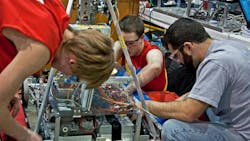Manufacturing Day 2024: Gearing Up for the Next Generation
Manufacturing is an essential part of a resilient economy, producing goods for domestic and international trade, driving research and innovation and providing well-paying jobs. From the medicines that keep people healthy to the smartphones that connect us, manufacturers are responsible for the products and services that enable our way of life.
In honor of Manufacturing Day, an initiative organized by the Manufacturing Institute to attract and energize the next generation of skilled manufacturing workers, let’s examine the state of the manufacturing industry and how companies are supporting new recruits and current employees in today’s fast-paced and increasingly digital world.
Manufacturing Growth
In the U.S., the manufacturing industry is growing steadily. According to the National Association of Manufacturers (NAM), the sector currently employs more than 13 million people, with nearly 500,000 job openings as of June 2024. Expansion is being driven by both government legislation and private sector investment. After the COVID-19 pandemic highlighted global supply chain vulnerabilities, many companies have been working to strengthen supply networks by increasing domestic manufacturing capabilities.
Manufacturing is also at the forefront of technological innovations with far-reaching impacts. U.S. manufacturers are responsible for more than half of all private-sector research and development, led by pharmaceuticals, semiconductor and electrical components and computer and electronic manufacturing. As part of the Investing in America agenda, the Creating Helpful Incentives to Produce Semiconductors and Science Act allocated $52 billion to bolster semiconductor research and manufacturing programs. Manufacturers are accelerating decarbonization and emission reduction efforts, with clean energy manufacturing supported by tax credits from the Inflation Reduction Act. These increasing incentives and investments in manufacturing are contributing to the rise of a wide variety of career opportunities.
Career Outlook
From a stable growth outlook to strong wages, the manufacturing industry offers promising careers for entry-level operators up to plant managers and engineers. NAM predicts that 3.8 million new manufacturing jobs will be needed by 2034, and the average annual pay for manufacturing employees is over $98,000 including benefits. The industry also has one of the highest percentages of employees eligible for employer-sponsored health benefits. The Kaiser Family Foundation reports that while 79% of all U.S. workers are eligible for health benefits offered by employers, 93% of manufacturing employees are eligible for benefit programs.
Persistent workforce challenges have motivated manufacturers to focus on attracting new applicants and retaining existing talent. Retention efforts include benefit programs, flexible work arrangements and training opportunities. Training can cover leadership and interpersonal skills as well as manufacturing techniques. As processes evolve with new technology such as simulation and automation, many manufacturers are investing in programs for employees such as online and virtual-reality platforms, apprenticeships and academies within the company and tuition reimbursement.
Workforce Development
Manufacturers are also combating the lack of job applicants with workforce development initiatives focused on diversity and inclusion. In this year’s talent study conducted by Deloitte and the Manufacturing Institute, more than 200 manufacturers were asked about labor market trends and their efforts to build a talent pipeline to fill open positions. Over 90% of survey respondents said they were forming at least one partnership with educational institutions, industry associations or community organizations to build awareness of manufacturing career opportunities and expand their talent pools.
These partnerships help manufacturers connect with different populations including women, people of color, veterans and immigrants. Working with organizations like the Association for Women in Science (AWIS) and the National Organization for the Professional Advancement of Black Chemists and Chemical Engineers (NOBCChE), manufacturers are helping facilitate networking and mentoring, sponsoring conferences and events and sharing job and internship postings.
Other workforce development programs are dedicated to competency-based and flexible learning opportunities, increasing job access to individuals with nontraditional backgrounds. For example, more than 60% of workers in the U.S. do not have a bachelor’s degree but may still possess valuable skills and experience. Known as STARS, short for Skilled Through Alternative Routes, individuals who may have been previously eliminated from the hiring pool due to a lack of a college degree can meet the necessary competency requirements and help meet labor force needs.
Many manufacturers are committed to supporting the future workforce—of which many, including PPG, invest in science, technology, engineering and mathematics (STEM) education and workforce development programs. It is important for students and communities to learn about the career potential and diverse job options available within the manufacturing industry, such as production, research and development, maintenance and operations.
We recognize that manufacturing production capabilities are central to the success and strength of our economy. Technology has changed many aspects of manufacturing, but the need for capable workers remains the same. Manufacturers like PPG are shaping the next wave of technology that will transform the way goods are produced, and we are ready to welcome and train the change leaders of tomorrow.
About the Author
Monica Huerta
Director of Operations, PPG, Industrial Segment in the Americas
Monica Huerta is director of operations for PPG’s Industrial Segment in the Americas. She is responsible for employees, operations, safety and quality of over 20 automotive, industrial and powder coatings manufacturing facilities in the U.S. and Latin America regions. She has more than 25 years of experience in operations, earned a B.S. in industrial engineering from Universidad Autónoma de Nuevo León and is Lean Six Sigma Black Belt certified. She lives in Columbus, Ohio.
